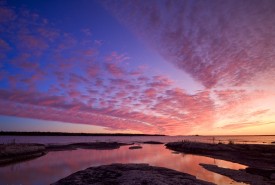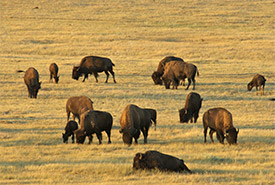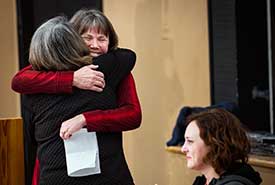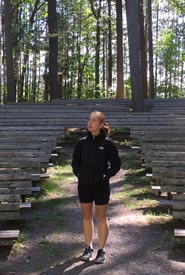Recognition and Reconciliation: The pathway forward is Indigenous-led conservation

Sunset at Hay Bay, Ontario (Photo by Ethan Meleg)
Friday, September 30 is National Day for Truth and Reconciliation. This day is intended to provide an opportunity for people to recognize and commemorate the legacy of residential schools. This day has also been observed as Orange Shirt Day since 2013, and is meant to honour Indigenous residential school Survivors, their families and communities as a vital part of the process of Reconciliation in Canada.
Another part of Reconciliation is the recognition of the trauma, injustice and infraction on the rights and responsibilities of Indigenous Peoples and communities on the land. Conservation by non-Indigenous people, including governments, organization and individuals, has not always been to the benefit of the communities who have depended and thrived on these lands since time immemorial.
At the time of colonization, development of the land and the eradication of Indigenous people who lived there and their respective culture and language was the priority, goal and largely the outcome in many areas of what we now call Canada. With colonization, settlers brought their own ideas and models for conservation, which were imposed on Indigenous Peoples and impacted their relationships with the lands. There was the impression by European settlers that lands were only protected in the absence of any human impact; an idea that conflicted with Indigenous kinship with the land and reciprocity.
However, the way we talk about, work and collaborate on the land has changed and evolved immensely. The dynamics of conservation in Canada are changing. Today, Indigenous Peoples are increasingly being heard and recognized as conservation decision-makers and stewards of the land. This has been largely due to nation-wide initiatives, such as the 94 Calls to Action from Truth and Reconciliation Commission, and the adoption of United Nations Declaration on the Rights of Indigenous Peoples.

Plains bison, Old Man on His Back Prairie and Heritage Conservation Area, SK (Photo by NCC)
Indigenous-led knowledge sharing by organizations, Nations and communities who are at the forefront of transformation in the conservation sector has influenced the conservation landscape in this country, and continues to help inform, shape and evolve policies that impact the land. Indigenous Peoples are leading the change on the land, and helping to reinforce traditional and contemporary ways of caring for natural areas. The only way to achieve large-scale conservation goals needed to lessen the impacts of climate change is by working with and supporting Indigenous-led conservation to decolonize the land. This includes respecting Indigenous Knowledge and worldviews, supporting Indigenous leadership and decolonizing conservation to heal the lands and those relationships with it.
Indigenous Peoples believe in reciprocity with the land. This relational approach has helped mend relationships on the land, and the land itself. The land is tied to community, Indigenous ways of life and culture. When the land thrives, Indigenous Peoples and all people thrive.

Nancy Newhouse, NCC's BC regional vice-president, hugs Ktunaxa Nation Council chairperson Kathryn Teneese at Jumbo Valley celebration (Photo by Pat Morrow)
Non-Indigenous organizations, governments and individuals have the opportunity to contribute to the process of Reconciliation by supporting Indigenous Peoples in many ways, including through conservation and protection efforts. Indigenous Protected and Conserved Areas (IPCAs) are natural spaces where Indigenous governments, communities and Nations have the primary role in conserving and managing ecosystems through Indigenous laws, governance and Traditional Knowledge systems. These areas help to reinforce Indigenous connection and culture that is deeply rooted in the land. They are a representation of Indigenous sovereignty.
IPCAs are a pivotal part of Canada’s conservation landscape and are helping to achieve biodiversity targets against climate change. They also provide an opportunity for nation-to-nation Reconciliation and land-based healing between Indigenous Peoples and non-Indigenous people. Indigenous-led conservation through the creation of IPCAs is built on reciprocal relationships between people and the lands. Supporting Indigenous-led conservation and the development of IPCAs is key to healing communities, working collaboratively and helping support Indigenous rights, responsibilities and sovereignty.
The pathway to Reconciliation involves looking back to confront the past and recognize the errors non-Indigenous people have made. Only through acknowledging these mistakes, healing relationships and working in reciprocity with the land and each other can we begin to forge a way forward.


